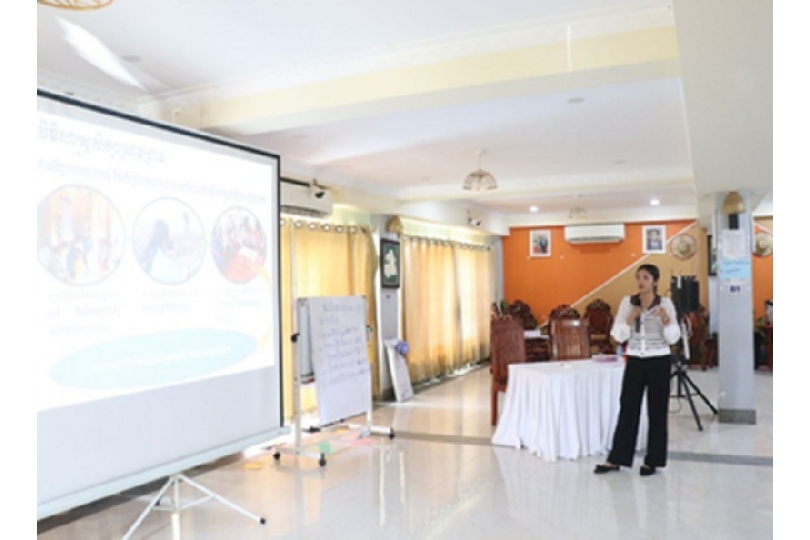Donor : UNDP
Project : The engagement’s indigenous youth, women networks in commune climate change budget and monitoring.
Date : 28th July, 2022

By: giant
Donor : UNDP
Project : The engagement’s indigenous youth, women networks in commune climate change budget and monitoring.
Date : 28th July, 2022
MVi organized one workshop at provincial levels to aware the champions for commune administration who have allocated more budget for climate change activities in commune plans and award for indigenous women and indigenous youths who are active to work with commune councilors for the success of budget allocation for climate change activities in the commune. It was attended from 120 participants (64 women, 56 youths, 03 LGBT+, 03 PWD) including indigenous women, indigenous youths from seven villages, and commune councilors from four communes, district officials, and provincial officials. This activity was implemented on 28th July, 2022 at Rasmey Pich hotel in Stung Treng province.
The outstanding commune on best praises of budget allocation for climate change in commune plans have been awarded to Kbal Romeas commune councilor. Active indigenous women have been awarded to Tourn Song women focal person and indigenous youths have been awarded to youth focal person in Samkhouy village.

By: giant
Good Governance and Social Accountability / Local Economic Development and Climate Change Adaptation
Donor: USAID and ADHOC
Project: Inclusive Participation of Indigenous Child and Youths in CEFM Reduction in indigenous communities (IPICiC)
Implement: MVi
Date: October 29, 2022
Young marriage is still a challenge in Cambodia, and in some areas, it is considered common, especially in Ratanakkiri and Mondulkiri provinces, where the rate of young people deciding to get married at a young age is up to 36 percent compared to other provinces across the country.

By: giant
Good Governance and Social Accountability / Local Economic Development and Climate Change Adaptation
Donor: USAID and ADHOC
Project: Inclusive Participation of Indigenous Child and Youths in CEFM Reduction in indigenous communities (IPICiC)
Implement: MVi
Date: October 29, 2022
Young marriage is still a challenge in Cambodia, and in some areas, it is considered common, especially in Ratanakkiri and Mondulkiri provinces, where the rate of young people deciding to get married at a young age is up to 36 percent compared to other provinces across the country.
Forcing a child to marry at a young age can have many consequences or disadvantages for child and parents in the future.
As shown in this educational video, forcing a child (youth) to get married at a young age, she/he forces to live with someone that she/he does not like (love), domestic violence, divorce, health problems and especially the loss of the future due to the compulsion to drop out of school, resulting in the loss of the opportunity to get a better job or career.
Every parent loves their child, wants to see them have a family, have children and grandchildren and happiness in the family, but this video also wants to send a message to all parents: “Forcing children to get married at a young age” It is not the right thing to do, but it is the loss of your children future, and you (parents) only regret it. If you really love your children, please give the opportunity, encourage and motivate them to study hard, that is the right thing to do, thank you!
#As a good parent, you should not force your child to get married at a young age.

In Borey O’Svaysenchay District, a locally led research initiative has transformed how community voices are recognized in fisheries management.
Facilitated by women and youth across three villages—Krom, Koh Snaeng, and Tunsang—the project monitored fish catch patterns and species abundance over four months, revealing actionable insights into sustainability and livelihood resilience.
Fishing is central to household economies and food security in the region. However, environmental degradation and overfishing have put long-term viability at risk. Historically, policies overlooked indigenous knowledge and women’s contributions in fish processing and marketing.
To counter this, the community research team, supported by MVi, underwent five months of capacity-building in data collection, analysis, and reporting. Marginalized voices were prioritized through inclusive facilitation and reflection.
Key findings highlighted traditional fishing techniques and locally adapted innovations that help sustain fish populations. The study also underscored women’s pivotal economic roles, emphasizing the need for gender-responsive governance.
“Our knowledge of fishing practices has been passed down through generations; it’s time for that knowledge to guide decisions.” — Thyda, woman leader, Krom “When women are part of the conversation, everyone benefits.” — Pheasdey, youth leader, Tunsang “This is about safeguarding our future.” — Somdon, woman leader, Koh Snaeng
The district governor’s commitment to integrate these findings into the 5-year development plan marks an institutional shift toward participatory planning.
This case demonstrates how community-led research can influence formal decision-making while elevating women’s leadership in environmental stewardship.